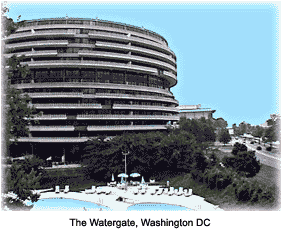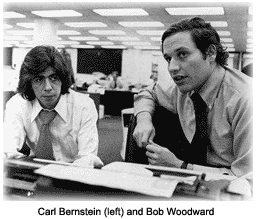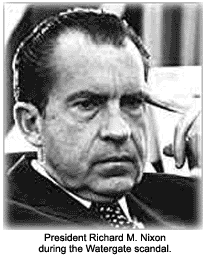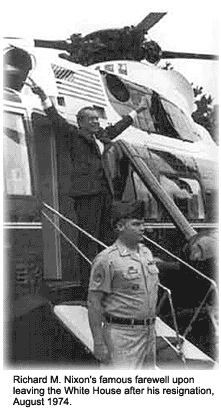Before the summer of 1972, the word "Watergate" meant nothing more than an office and luxurious apartment complex in Washington, D.C. As a result of a "third-rate burglary" on June 17 of that year, it came to be associated with the greatest political scandal of that century and would change the lives of the many people involved — especially President Richard M. Nixon.
 While doing his rounds at the Watergate Hotel in the early morning of June 17, 1972, security guard Frank Wills found a door, located between the basement stairwell and the parking garage, that was being prevented from latching by a piece of tape. He removed the tape and continued his rounds. Returning to the same spot later, he discovered that someone had re-taped the door. His curiosity now aroused, he called the police. Around 2:30 a.m., after the police arrived, five men, wearing business suits and latex gloves, were arrested in the offices of the Democratic National Committee. The men had been repairing wiretapping equipment and, according to some, taking pictures of documentation.
While doing his rounds at the Watergate Hotel in the early morning of June 17, 1972, security guard Frank Wills found a door, located between the basement stairwell and the parking garage, that was being prevented from latching by a piece of tape. He removed the tape and continued his rounds. Returning to the same spot later, he discovered that someone had re-taped the door. His curiosity now aroused, he called the police. Around 2:30 a.m., after the police arrived, five men, wearing business suits and latex gloves, were arrested in the offices of the Democratic National Committee. The men had been repairing wiretapping equipment and, according to some, taking pictures of documentation.
The five burglars were later identified as Bernard Barker, Virgilio Gonzalez, Eugenio Martinez, Frank Sturgis, and James W. McCord Jr. Bob Woodward of the Washington Post was present at their arraignment and overheard McCord mention "CIA" in connection with his occupation. Another of the arrested men identified his occupation as "anti-communist." Intrigued, Woodward investigated further. It was later established that McCord was responsible for security for the Committee to Re-Elect the President (CRP), i.e. to re-elect Republican Richard M. Nixon. Another link to the White House came to light when the phone number for E. Howard Hunt, a former White House employee, was found in Barker's notebook.
It later appeared that Hunt and G. Gordon Liddy, who was a member of the “Plumbers” and therefore connected with the White House, had been stationed nearby and were in communication with the burglars. The White House’s Special Investigation Unit, nicknamed the “Plumbers,” had been established by John Ehrlichman to prevent information leaks from the White House and were also involved in various activities perpetrated against Democrats and antiwar protestors. Their most famous mission was the break-in at the home of former Pentagon employee Daniel Ellsberg, where they unsuccessfully attempted to prevent further leaks of confidential information, the Pentagon Papers). Four of the burglars had CIA connections and had been involved in the Bay of Pigs Invasion.
Almost immediately, a cover-up was undertaken by persons associated with the president and his campaign. Jeb Magruder and others destroyed documents and lied to investigators. The acting director of the FBI, L. Patrick Gray, received and destroyed documents from Ehrlichman, who was a top aide to the president, and from White House council John Dean III. After learning from White House Chief of Staff Robert Haldeman on June 23, 1972, that his former attorney general John Mitchell, who was now running the Committee to Re-elect the President (CREEP), might be involved; President Nixon instructed Haldeman to head off a possible FBI investigation. Nixon argued that the investigation might interfere with a CIA operation. Dean and others later tried to get the CIA to go along with the plan. On July 1, Mitchell resigned from the CREEP. He cited "personal reasons."
 Woodward teamed up with Carl Bernstein to report on the Watergate scandal throughout the summer. Woodward and Bernstein received information from someone with inside knowledge of the White House, a source known as "Deep Throat."* According to Woodward, Deep Throat only confirmed information that Woodward had already received from other inside sources. The Post's interest in the case was not shared much by other newspapers. Although the Post continued to investigate, little more came to light during the balance of the campaign. On August 19, Nixon declared that no one then employed in his administration was involved in Watergate. On September 15, indictments were handed down on the five men arrested on June 26, plus Liddy and Hunt.
Woodward teamed up with Carl Bernstein to report on the Watergate scandal throughout the summer. Woodward and Bernstein received information from someone with inside knowledge of the White House, a source known as "Deep Throat."* According to Woodward, Deep Throat only confirmed information that Woodward had already received from other inside sources. The Post's interest in the case was not shared much by other newspapers. Although the Post continued to investigate, little more came to light during the balance of the campaign. On August 19, Nixon declared that no one then employed in his administration was involved in Watergate. On September 15, indictments were handed down on the five men arrested on June 26, plus Liddy and Hunt.
On November 7, 1972, Nixon was re-elected president in one of the most resounding landslide victories in American political history, losing only Massachusetts and the District of Columbia to Senator ^George McGovern^. Information obtained from the Democratic National Committee offices was allegedly used to aid Nixon in his re-election campaign.
In January 1973, two months after Nixon's re-election, the seven indicted men were tried before Judge John Sirica in the U.S. District Court in Washington, D.C. Five pleaded guilty, and McCord and Liddy were convicted of conspiracy, burglary, and illegal wiretapping. Meanwhile, suspicions grew that the break-in was part of a broad program of political espionage. The U.S. Senate voted to conduct an investigation. The grand jury continued to hear witnesses.
During hearings on Gray’s nomination to be made permanent director of the FBI, he revealed that he had given FBI Watergate files to Dean. His testimony suggested that other top White House aides were involved in clandestine activities. On March 21, Dean wrote to Nixon and warned him that Watergate had become a "cancer growing on the presidency." He said that Hunt had issued a thinly veiled threat to tell about the Plumbers' activities unless he received hush money. That night, $75,000 was passed to Hunt. Nixon later stated publicly that he had begun a new investigation of Watergate on March 21, but on March 22 he told Mitchell, "I want you all to stonewall it, let them plead the Fifth Amendment; cover-up or anything else, if it'll save it; save the plan."
 In a letter to Judge Sirica received on March 23, McCord charged that witnesses had committed perjury at the trial and that the defendants had been pressured to plead guilty and remain silent. Hoping to avoid a severe sentence, McCord cooperated with investigators and implicated Dean and Magruder in the break-in. Dean and Magruder then abandoned the cover-up and implicated other White House and CRP officials. Investigators were told that Mitchell had approved the break-in, that transcripts of conversations taped at the DNC were given to aide Gordon C. Strachan for delivery to Haldeman, and that Ehrlichman had ordered the destruction of documents. On April 30, Nixon announced the resignations of Haldeman and Ehrlichman, and the firing of Dean. Attorney General Richard Kleindienst resigned rather than prosecute men he knew. Nixon and Elliot Richardson, the new attorney general, approved the creation of a special prosecutor's office, headed by Archibald Cox of the Harvard Law School.
In a letter to Judge Sirica received on March 23, McCord charged that witnesses had committed perjury at the trial and that the defendants had been pressured to plead guilty and remain silent. Hoping to avoid a severe sentence, McCord cooperated with investigators and implicated Dean and Magruder in the break-in. Dean and Magruder then abandoned the cover-up and implicated other White House and CRP officials. Investigators were told that Mitchell had approved the break-in, that transcripts of conversations taped at the DNC were given to aide Gordon C. Strachan for delivery to Haldeman, and that Ehrlichman had ordered the destruction of documents. On April 30, Nixon announced the resignations of Haldeman and Ehrlichman, and the firing of Dean. Attorney General Richard Kleindienst resigned rather than prosecute men he knew. Nixon and Elliot Richardson, the new attorney general, approved the creation of a special prosecutor's office, headed by Archibald Cox of the Harvard Law School.
The Senate's Select Committee on Presidential Campaign Activities, under the chairmanship of Senator Sam Ervin of North Carolina, opened public hearings in May. In the end, 40 government officials were indicted. Dean's testimony linked Nixon and his re-election fundraising committee to the cover-up. Haldeman, Ehrlichman, and Mitchell denied wrongdoing and defended the president.
On July 16, 1973, Alexander Butterfield, a former White House official, testified to the Ervin Committee that Nixon had taped his own conversations in the White House for a period of time that included the alleged Watergate cover-up. Cox subpoenaed a number of tapes that he felt were essential to the investigation. Nixon refused to release them. Judge Sirica directed Nixon to let him hear the tapes. Nixon appealed the order, arguing that a president was immune from judicial orders enforcing subpoenas and that under the concept of executive privilege only he could decide which communications could be disclosed.
When the U.S. Court of Appeals upheld Sirica, Nixon countered with a suggestion that Senator John Stennis of Mississippi listen to the tapes and verify an edited version that Nixon would submit to the grand jury and to the Senate committee. Cox rejected this proposal along with Nixon's order that he make no further attempts to obtain tapes. Nixon told Attorney General Richardson to fire Cox. Richardson, having assured Congress that the prosecutor would be free to pursue the investigation, resigned instead. Nixon gave the same order to Deputy Attorney General William Ruckelshaus, who also refused. Nixon fired him. His Solicitor General Robert Bork then fired Cox. The actions of October 20, which became known as the "Saturday Night Massacre," launched the first serious moves to impeach Nixon.
Nixon at last agreed to give the tapes to Sirica, and he appointed Leon Jaworski, a Texas attorney, to succeed Cox. Nixon guaranteed that Jaworski would be free of White House control. However, problems with the tapes got worse. According to the White House, two subpoenaed conversations had never been taped and another contained an 18-minute gap. On December 7, 1973, Rose Mary Woods, Nixon's loyal secretary, claimed it was an accident. Six court-appointed electronics experts said that at least five separate erasures had caused the gap. Suspicions grew that evidence had been deliberately destroyed.
Evidence against Nixon, given to Judge Sirica by the grand jury, was turned over to the House Judiciary Committee, which had begun its impeachment investigation. The committee subpoenaed 42 more tapes in April 1974. On April 30, Nixon released edited transcripts but not the actual recordings of 46 conversations. Legal experts disagreed on whether the transcripts established that Nixon was a part of the conspiracy. What was clearly shown was Nixon's vulgar speech habits, and the phrase "expletive deleted" entered common use.
Meanwhile, Jaworski asked Sirica to subpoena 64 tapes and documents. Nixon refused the subpoena, claiming executive privilege, and Jaworski took the issue to the U.S. Supreme Court. In an 8-to-0 decision on July 24, with William Rehnquist abstaining, the court rejected Nixon's claim and ordered him to obey the subpoena. Nixon did so.
When the president's lawyer, James St. Clair, learned that one of the 64 tapes was made on the June 23, 1972, conversation with Haldeman in which Nixon sought to thwart the FBI investigation, he insisted that Nixon publish it. Nixon did so on August 5, 1974.
 Having opened its impeachment hearings on May 9, the House committee had already considered five possible articles of Impeachment and over a period of several days in late July, approved three of them. Barbara Jordan discussed the ramifications of the impeachment process:
Having opened its impeachment hearings on May 9, the House committee had already considered five possible articles of Impeachment and over a period of several days in late July, approved three of them. Barbara Jordan discussed the ramifications of the impeachment process:
It is wrong, I suggest, it is a misreading of the Constitution for any member here to assert that for a member to vote for an article of impeachment means that that member must be convinced that the President should be removed from office. The Constitution doesn't say that. The powers relating to impeachment are an essential check in the hands of the body of the legislature against and upon the encroachments of the executive. The division between the two branches of the legislature, the House and the Senate, assigning to the one the right to accuse and to the other the right to judge, the framers of this Constitution were very astute. They did not make the accusers and the judgers -- and the judges the same person.Nixon’s strongest supporters in Congress had said they wouldn't vote to impeach without a "smoking gun" but the June 23 tape was it. Nixon's support in Congress virtually disappeared. Facing certain impeachment and removal from office, Nixon resigned on August 8 in a nationally televised address, effective at noon August 9. During the address from the Oval Office, he said, "By taking this action, I hope that I will have hastened the start of the process of healing which is so desperately needed in America."
His successor, Gerald Ford, decided that the nation needed to move beyond Watergate and so on September 8, he pardoned Nixon for any crimes he might have committed during his term as president. On March 1, 1974, a grand jury had indicted seven former White House aides — Haldeman, Ehrlichman, Mitchell, leading aid Charles Colson, Gordon C. Strachan, Robert Mardian, and Kenneth Parkinson — for obstructing the Watergate investigation. Nixon had been named an unindicted co-conspirator, and Dean and Magruder, along with lesser figures in the scandal, had already pleaded guilty. Colson later pleaded guilty to charges concerning the Ellsberg case and cover-up charges against him were dropped as were all charges against Strachan. The remaining five went on trial in October 1974, and on January 1, 1975, all but Parkinson were found guilty. In 1976, a court of appeals ordered a new trial for Mardian, and eventually all charges against him were dropped. Ehrlichman went to prison in 1976, Mitchell and Haldeman in 1977.